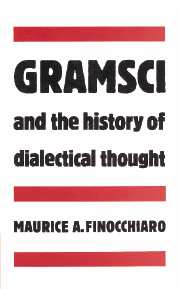Book contents
- Frontmatter
- Contents
- Preface and acknowledgments
- INTRODUCTION: AN APPROACH TO GRAMSCI
- Chapter 1 GRAMSCI'S CROCEAN CRITIQUE OF CROCE'S PHILOSOPHY
- Chapter 2 CROCE AND THE THEORY AND PRACTICE OF CRITICISM
- Chapter 3 GRAMSCI'S METHODOLOGICAL CRITICISM OF BUKHARIN'S SOCIOLOGY
- Chapter 4 BUKHARIN AND THE THEORY AND PRACTICE OF SCIENCE
- Chapter 5 GRAMSCI'S DIALECTICAL INTERPRETATION OF MACHIAVELLI'S POLITICS
- Chapter 6 GRAMSCI'S POLITICAL TRANSLATION OF HEGELIAN-MARXIAN DIALECTIC
- Chapter 7 HEGEL AND THE THEORY AND PRACTICE OF DIALECTIC
- Chapter 8 GRAMSCI AND THE EVALUATION OF MARXISM
- CONCLUSION: DIALECTICAL METHODOLOGY AND TEXTUAL CRITICISM
- Appendix: Concordance of critical edition and English translations
- Notes
- Bibliography
- Index
Chapter 2 - CROCE AND THE THEORY AND PRACTICE OF CRITICISM
Published online by Cambridge University Press: 10 December 2009
- Frontmatter
- Contents
- Preface and acknowledgments
- INTRODUCTION: AN APPROACH TO GRAMSCI
- Chapter 1 GRAMSCI'S CROCEAN CRITIQUE OF CROCE'S PHILOSOPHY
- Chapter 2 CROCE AND THE THEORY AND PRACTICE OF CRITICISM
- Chapter 3 GRAMSCI'S METHODOLOGICAL CRITICISM OF BUKHARIN'S SOCIOLOGY
- Chapter 4 BUKHARIN AND THE THEORY AND PRACTICE OF SCIENCE
- Chapter 5 GRAMSCI'S DIALECTICAL INTERPRETATION OF MACHIAVELLI'S POLITICS
- Chapter 6 GRAMSCI'S POLITICAL TRANSLATION OF HEGELIAN-MARXIAN DIALECTIC
- Chapter 7 HEGEL AND THE THEORY AND PRACTICE OF DIALECTIC
- Chapter 8 GRAMSCI AND THE EVALUATION OF MARXISM
- CONCLUSION: DIALECTICAL METHODOLOGY AND TEXTUAL CRITICISM
- Appendix: Concordance of critical edition and English translations
- Notes
- Bibliography
- Index
Summary
I have reconstructed Gramsci's explicit reflections on Croce as a defense of the religious and philosophical dimension of Marxism from Croce's liquidationist criticism. I also suggested a favorable evaluation of Gramsci's critique, insofar as I reconstructed this critique as an argument to the effect that Croce's negative conclusions about Marxism do not follow from his own principles and methods, which, on the contrary, can serve as the basis for a positive evaluation of Marxism along the same dimension. Although my reconstruction was sufficiently grounded on Gramscian texts to leave no doubt about its accuracy, the same cannot be said of my evaluation, concerning which I may say that it was primarily stated, rather than justified for its accuracy. Such a justification would need to be grounded on a more extensive account of Crocean ideas and texts than was proper to introduce in the context of the discussion in Chapter 1. It is the purpose of this chapter to undertake such a desirable task.
Moreover, such an account is more than merely desirable. It is desirable from the point of view of my evaluation of Gramsci's critique, which was positive and favorable. However, from the point of view of my evaluation of Croce's liquidationist criticism, more Crocean evidence is necessary, since my evaluation more or less coincided with Gramsci's, and was thus negative and unfavorable. Such a difference in the kind of justification to be provided stems from a fundamental principle that guides these investigations, namely, that higher standards of hermeneutical evidence apply for the documentation of a negative evaluation than for the documentation of a positive one.
- Type
- Chapter
- Information
- Gramsci and the History of Dialectical Thought , pp. 28 - 67Publisher: Cambridge University PressPrint publication year: 1989

